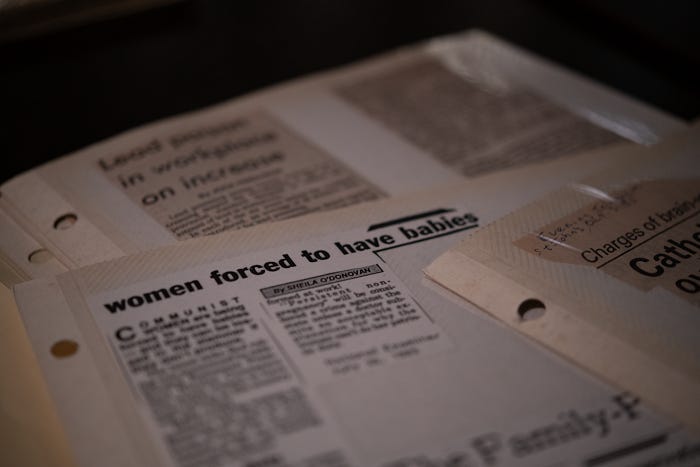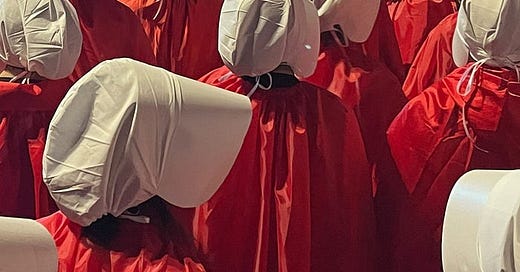Everything In Handmaid’s Tale Has Already Happened
I don’t know how to warn a world that doesn’t want to listen
Sometimes, I wonder what it must feel like to be Margaret Atwood.
I don’t mean being a bestselling author, having sixty books and countless book awards to my name, like Atwood has. I mean watching the news as things she wrote in a book forty years ago slowly come true. Bit by bit.
The Handmaid’s tale is a fictional story of America after the Constitution fell. A religious group called Sons of Jacob stormed the government and took control. Their goal was to make America great again. I’m not even joking. Wish I was.
The authoritarian regime didn’t happen overnight. It happened piece by piece, law by law, restriction by restriction. Rich religious men taking over while the people watched, shocked, stunned, not knowing what to do. How to stop them.
That’s really what the book is about. Written in 1984.
You can’t make this up. 1984. Hello, Orwell.
First time President Trump was elected, sales of The Handmaid’s Tale went through the roof. Sales went so crazy they made a television series. Think about that. Published in 1984. Thirty three years later, they made a series.
In The Handmaid’s tale, birth rates in America are going down. So they started peeling away women’s rights. First abortion was banned. Then birth control. Then the right to vote and finally, the right for women to have money.
Any of that sound vaguely familiar?
So when Roe vs. Wade fell?
Her book shot to the top of the charts again.
Atwood keeps talking about it in the news, every time her book shoots back up to the top of the charts because of political change.
Here’s what people ask her. Every single time.
“Omg, where did you get the ideas for The Handmaid’s Tale?”
It’s like they’re trying to figure out how one woman could think up such a dystopian mess of a world. So they ask her where the ideas came from.
She always says the same thing.
From history.
It’s all happened already.
She’s been saying that since 1984.
Everything in that book already happened somewhere in the world and much of what happens in The Handmaid’s Tale happened right in America. Oppression of women is pretty much America’s history. It took years and years to change the oppression.
Unmarried women weren’t allowed birth control until 1972 and women couldn’t have bank accounts without a man’s permission until 1974. When Atwood wrote the book, abortion was still legal and women could get birth control right across America.
But that’s changing now.
And her book is selling like crazy again.
It all started with a witch.
Most people don’t know that. Atwood had an ancestor who was hanged as a witch.
Her name was Mary Webster and she was tried as a witch in 1683. She was found innocent but the villagers disagreed with the verdict so they lynched her and hung her from a tree. Next morning they buried her limp body in a snowbank.
Imagine their surprise when they found her in her house cooking dinner.
Atwood says she couldn’t stop wondering how Mary Webster survived the night. What was she thinking, dangling from that tree all night?
“The thing we’ll never know is, how did she make it through the night? What was she doing all night when she was dangling from a tree? What was she thinking about?” — Margaret Atwood (source)
Mary Webster is why Atwood studied 17th-century America and Puritan history and values. Her professor’s name was Perry Miller. He helped her understand the world Mary Webster lived and died in.
She says Webster is her favorite ancestor.
She is my favorite ancestor, more dear to my heart even than the privateers and the massacred French Protestants, and if there’s one thing I hope I’ve inherited from her, it’s her neck. — Margaret Atwood (source)
If you open “The Handmaid’s Tale” you’ll find a dedication right before page one. It’s short and simple.
To Mary Webster and Perry Miller.
When you read the book, it so easy to get pulled into the story you don’t even see the parallels. When the book opens, June, her husband and their daughter are trying to escape to Canada but they get caught. Brought back behind the wall.
“The wall” was a big brick wall. Big wall. Really big wall. Build around Gilead to keep the undesirables out. Sound familiar?
It was also handy to keep people in. Especially the people trying to escape.
June’s husband dies and their daughter is given to a wealthy family because rich people can afford to provide for kids better than poor people. June is taken off to become a handmaid named Offred. Her new job is to act like a maid and have babies for the wealthy people that own her.
Doesn’t occur to the reader for a while that her name isn’t really Offred. It’s just identifying her by the man that owns her. Her name doesn’t matter. She is the property of Fred. Of Fred. Offred.
Puritan women didn’t use their names either. They were all called “Goodwife” and then their husband’s name. And those dresses and bonnets? Make the dresses black, brown and navy and you have the official outfit of a 17th century Puritan woman.
Poor women having babies for rich people isn’t new either. In the south, enslaved women were forced to have children by their owners. Happened in Nazi Germany, too, when women with the right coloring were made to have little SS babies. But where Atwood actually took it from was the Bible. The Bible quote is on page one of the book. Genesis 30:1–3
There was a cult in America where women were called Handmaids of God. So she just combined the practice from Genesis and paired it up with the title handmaids.
In one scene, Offred is sitting by the “wall” and there are bodies hanging there. Gay men and doctors who were caught performing abortions. The Sons of Jacob said there are only two genders, so being gay was a crime. But they only hung gay men because lesbian women can make babies so they were forced to bear children for the wealthy if they were fertile. If they weren’t fertile, they were sent to work camps.
Atwood started writing the book in the early 1980’s in Berlin, when the Berlin Wall was still standing. Looking at that wall made her wonder what a totalitarian, theocratic America would look like. Wasn’t hard to imagine given that she’d studied the history of 17th-century Puritans.
She just layered the past on top of the present.
“There’s a precedent in real life for everything in the book,” she says. “I decided not to put anything in that somebody somewhere hadn’t already done. But you write these books so they won’t come true.”
In 2019, Atwood did an interview at Fisher Library in Toronto. It’s where she stores all the notes and newspaper clippings she kept when she was writing The Handmaid’s Tale. Boxes and boxes of newspaper clippings, all nicely laminated and stored by date.
There was no internet, so as she wrote, she collected newspaper articles to back up everything she was writing. They have titles like;
She said she didn’t even need to research. It was all over the newspapers and magazines. She just cut it all out and saved it in a box.
…you couldn’t just go online and put in a topic, so this is just stuff I came across when reading newspapers and magazines. I cut things out and put them in a box. I already knew what I was writing about and this was backup. In case someone said, ‘How did you make this up?’ As I’ve said about a million times, I didn’t make it up. This is the proof — everything in these boxes. (Penguin)

In the book, Offred’s owner tells her “better” never meant better for everyone. For some people, it’s going to be worse.
She’s right about that, too. Like the women living in states where there is no abortion and no exception for rape or incest. And like the nineteen million women living in contraceptive deserts. Like the sixty nine million married women who may lose the vote if the SAVE Act is passed.
Let me tell you about the SAVE Act in case you’re not familiar. It’s a bill proposed in congress saying that a voter’s current ID must match their birth identification in order to vote. So married women who changed their name? Would need other id.
“There’s a precedent in real life for everything in the book,” Atwood says. “I decided not to put anything in that somebody somewhere hadn’t already done. But you write these books so they won’t come true.”
I wish that was true.
I wish writing that book meant it wouldn’t come true. But I don’t know how to warn a world that doesn’t want to listen. And I don’t know what to do about it. So I do the only thing I know how to do. Write.
If you write on Substack, check out my other publication, Hello Writer





I’ve saved this quote from her for years.
“I didn’t put anything into the book that has not happened sometime, somewhere,” … Or wasn’t happening then and isn’t happening now. So you can call that feminist, if you like. I didn’t start from ideology, I started from what I was collecting and seeing.”
It is so hard to see the writing literally on the wall, point it out to everyone, and watch them all go about their day as if everything were normal.
Thank you for pointing. I am listening.